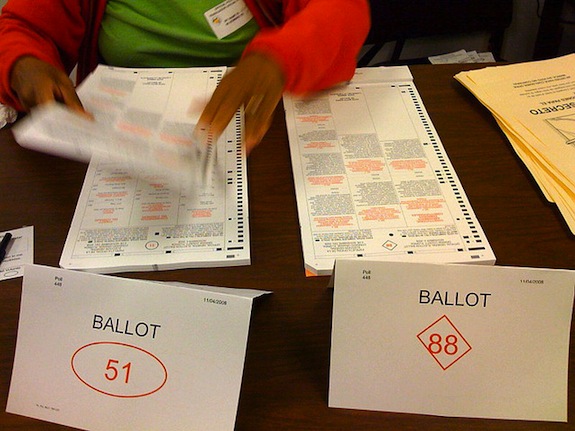By Ashley Lopez
Florida Center for Investigative Reporting
Political soothsayer Nate Silver writes at The New York Times that Florida is one of two tipping point states for the 2012 election.
There are a lot of “states to watch” predictions being thrown around right now. For example, Iowa, Virginia, North Carolina and Colorado are getting a lot of attention.
However, there is pretty much a consensus that two states — Florida and Ohio — will decide the 2012 election. This week, Silver put his seal of approval on this claim.
He writes:
Florida now ranks a clear second on our list of tipping point states, those most likely to provide the decisive votes in the Electoral College, behind only Ohio.
Florida is typically just slightly Republican-leaning, and the tipping point calculation is sensitive to even the smallest deviations from the national averages. As I’ve argued before, for instance, North Carolina isn’t that essential to the electoral math, even though the race there is quite close, because other states that would help get a candidate to 270 electoral votes precede it in the pecking order.
But as the election has evolved, Mr. Obama’s polling has held up fairly well in Florida, including another decent poll there on Tuesday, which put him four points ahead.
Most politically savvy are saying that if Democratic incumbent Barack Obama wins Florida, he can wipe his brow and claim victory. With Florida in the bag, Silver writes, Obama won’t need “Virginia, Colorado and Iowa, along with Ohio, Wisconsin, and North Carolina, and either New Hampshire or Nevada, and still win the Electoral College.”
Republican presidential challenger Mitt Romney, however, has a much bigger challenge. According to Silver, it is also safe to say that Florida is a must-win for Romney, which is something commonly now, too.
Simulations estimate that Mr. Romney has only a 2 percent chance of winning the election if he loses Florida — even assuming that the election is very close over all. Losing its 29 electoral votes just presents too daunting a challenge for him, given his inability so far to penetrate into states like Pennsylvania that could plausibly substitute for it.
The numbers aren’t remotely that overwhelming for any other state. Mr. Romney has a 15 percent chance of winning a close election despite losing Ohio, for instance — not pleasant odds, but also far from impossible. If he lost Virginia, he’d still have a 19 percent chance of winning a close election; Colorado, a 28 percent chance; Wisconsin, a 37 percent chance, and so forth.
So, it isn’t a cliché to call Florida a must-win for Mr. Romney; he very badly needs it.
This is why the fight over Florida has turned to voting rights. The state is one of the deciding factors in this election, and it’s a tossup.
Republicans are being accused of passing laws aimed at “suppressing” Democratic turnout in Florida. Among them are a reduction in early voting days and a voter purge targeting non-citizens in the state.
Democrats and progressive groups have responded by launching massive efforts to get out the vote in Florida.
No matter what happens, this election will likely be viewed by this lens. The Republicans have to win the state in order to win an election, and Democrats are already claiming the game is rigged.
Ruth Rosen of the History News Network writes at Truthout:
How will the American presidential election be won in November 2012? By the Republicans buying the election? Perhaps. But money cannot always buy an election. That is why Republicans have spent the last four to six years passing a spate of voter suppression laws in “swing states” that will make it more difficult and costly for the young, the elderly, minorities, union members and single and elderly women to cast a vote for Barack Obama.
Although the Republican effort is not exactly a secret, few Americans are discussing it with the urgency it deserves. The nonpartisan Brennan Center for Justice at the New York University School of Law says that since the start of 2011, 16 states — which account for 214 electoral votes — have passed restrictive voting laws. Each law is different: some curb voter registration drives; others require new and costly forms of identification; and still others insist that voters produce government-issued photo IDs at the polls.
In fact, Rosen even called for the international community to monitor this election. Republicans so far have remained mum — largely disregarding claims that they are trying to rig an election, even in a state like Florida where fears of a rigged election are becoming more urgent.

